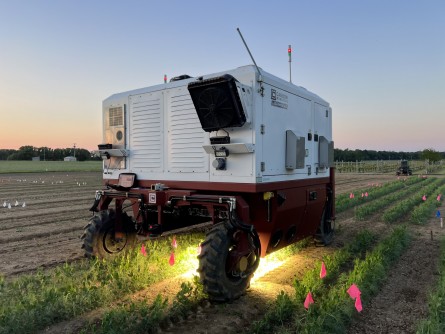A groundbreaking approach to weed control is emerging from a collaboration between scientists at Rutgers University and Cornell University. Led by Thierry Besançon, an associate professor in the Department of Plant Biology, the team is testing a tractor-sized machine that uses lasers and artificial intelligence to identify and eliminate unwanted weeds. This innovative method, currently undergoing field trials in New Jersey, presents a chemical-free alternative to traditional herbicides.
The technology, described as “pure physics” by Besançon, utilizes light energy to target weeds without the use of herbicides. Recent findings from the first peer-reviewed study on artificial intelligence-guided laser weeding in the eastern United States were published in the journal Pest Management Science. The results indicate that the laser weeder performs comparably to conventional herbicides in controlling weeds, and in certain instances, enhances crop growth.
Field Trials and Technology Overview
The field trials were conducted in the spring and summer of 2024 at the Rutgers Agricultural Research and Extension Center in Upper Deerfield, near Bridgeton, New Jersey. The research focused on high-demand crops such as spinach, peas, and beets, which are prevalent in the region. Given that many of these specialty crops have limited or no approved herbicides, the need for effective weed control is critical for local farmers.
The laser weeder, developed by Carbon Robotics, employs high-resolution cameras and deep learning algorithms to differentiate between crops and weeds in real time. The device fires precise laser beams at unwanted plants, effectively obliterating them without harming nearby crops. Besançon noted, “We had weeds growing just half a centimeter from the crop seedlings, and there was no laser damage to the crops. It’s extremely precise.”
The trials, supported by the Vegetable Growers Association of New Jersey and the Rutgers New Jersey Agricultural Experiment Station, have garnered attention for their potential impact on weed management practices.
Expert Endorsements and Future Prospects
The significance of this research has been highlighted by Stephen O. Duke, a veteran weed scientist at the University of Mississippi. In an editorial in Pest Management Science, he characterized the findings as “potentially transformative,” likening the technology to the introduction of glyphosate-resistant crops, which revolutionized agricultural practices.
Despite the promising results, challenges remain. The equipment, with a starting price around $500,000, is costly and requires multiple passes during the growing season, particularly in the wetter climate of the East Coast. The technology is most effective on small weeds, necessitating constant monitoring by farmers. “You can’t wait too long,” Besançon cautioned, stating that larger weeds would require more energy and slow down the process.
As the technology advances, manufacturers are developing faster, more efficient versions of the laser weeder. Besançon anticipates that these improvements could allow operators to drive the machine at speeds of up to five miles per hour, compared to the current speed of one to two miles per hour.
The potential benefits of this laser weeding technology extend beyond just efficiency. By eliminating the need for chemical herbicides, it reduces exposure for workers, consumers, and the environment. This is particularly important in light of the growing issue of herbicide-resistant weeds, such as Palmer amaranth, which pose significant challenges to farmers in New Jersey and beyond.
As the technology matures and becomes more affordable, it may fundamentally change weed management strategies, especially for organic and specialty crop growers. “We’re talking about our food supply,” Besançon emphasized, highlighting the importance of innovative solutions in agriculture. “We need better ways to control weeds without harming the crops or the planet.”
Reflecting on the journey into the realm of laser technology, Besançon expressed a sense of disbelief at the advancements made. “Ten years ago, I would not have believed it. But here we are. It’s exciting, and it’s just the beginning.”
The collaborative research effort, which also included contributions from technician Wesley Bouchelle at the New Jersey Agricultural Experiment Station, signals a promising future for sustainable agriculture in the region and beyond.







